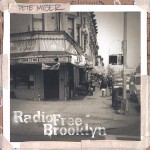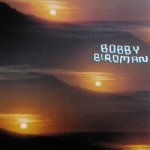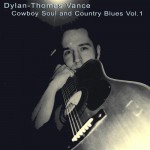Pete Miser
 Radio Free Brooklyn
Radio Free Brooklyn
Ho-Made Media
Rapper Pete Ho has been an integral part of the Portland hip-hop art scene, since his teen years when he first acquired a reputation as one of the most talented taggers in the local graffiti underground, back in the mid-80s; known, even then, as Pete Miser. Pete Miser became one of the key players in the nascent P-town hip-hop movement of the late ‘80s and early ‘90s.
Forming his first band, the 5 Fingers of Funk, Pete spent much of the ’90s producing the group- which combined funky horns, guitar and bass, with more traditional hip-hop accoutrements, such as a platter slapping DJ and an MC touting Pete’s prowess; with Pete’s spectacular poetry and intelligent viewpoint, at the forefront of the band. The 5 Fingers became one of the foremost hip hop bands in the Northwest. They toured the country several times, and played with the likes of Maceo Parker and Run DMC
The 5 Fingers released two albums with Pete at the helm. Then, in 1996, he released his first solo album, What It Be. The three albums combined for sales of over 20,000 units. Late in the decade he decided to move to New York, “to immerse himself in hip hop culture in its birthplace.”
It was not long before he was drafted by the singer Dido to serve as the DJ in her band, touring the US and four continents, while appearing on all the popular late night television variety shows. He has since produced numerous projects for an assortment of other acts, including hip-hopper 6th Sense. In addition, he has even worked with new wave act the Cure.
So, after a certainly not unproductive seven year hiatus, Pete has returned with the follow-up to that first solo album he released in 1996. What is immediately apparent is how much Pete has matured. His voice is now deeper and more authoritative.
His lyrics are as incisive as ever, confronting issues that have haunted him throughout his life, spoken forthrightly, yet without needless profanity, banality or puerility. While some, unfamiliar with his work, might even detect an occasional Eminem-ish slant to some of his more fiery rhymes (though without the rage), it is always good to remember that Pete was out in the trenches when Marshall was still living at home, drinking his mama’s beer.
The loose theme here among the thirteen songs and six linking segments is that we’re tuning into “Radio Free Brooklyn,” ostensibly being transmitted from Pete’s neighborhood, possibly following a nuclear attack on New York City. The styles vary from track to track. They move from straight-ahead hip hop forays to vague Beastie Boys references, some very cool space jazz interludes, and chunks of electronica- and even a beautiful contemplation upon the 9-11 tragedy. He exhibits the sort of exciting talent at his craft that few of his rap predecessors or peers have ever displayed. He even includes legendary drummer Mel Brown on one track, with a quote in tribute to the late bassist Leroy Vinegar sewn in to the mix as well.
The album kicks off with “Bring It To The Masses.” Over a wired up bed of loops and scratches, Pete introduces himself, inaugurating the effort with something of an autobiographical resume. “Celebration, tune into your local station/Apocalypse now from the foul mouth half-Asian.”
The title-track is a wry dreamscape, which shadows the apocalypse of nuclear war, while echoing the horror of the 9-11. “I made my way, fumbling through the dark/Trippin’ over debris and body parts/Can’t start panicking, ran up in the tollbooth/Tried to call for help, but then I learned the cold truth/The phone was dead and so was the attendant, but her radio was on and it said New York was gone.”
At which point a blaise DJ enters into the picture. “Who Nelly! Sorry about the turbulence. If you’re just tuning in, you’re listening to Radio Free Brooklyn. That big bump you felt was what we in the industry call a nuclear attack.” The DJ goes on to cheerfully describe the destruction, arriving at the droll assertion, “Kids, I think it’s safe to say that schools are closed.” A harrowing picture drawn upon a musical canvas reminiscent of Sneaker Pimps’ “Six Down.”
“Ho-Made” confronts the issue of the prejudice he has experienced in regard to his Chinese heritage: “Never segregated but berated with racial slurs on occasion/Facin’ the fact some kids don’t like half-Asians.” But Pete found the means to rise above. “”Didn’t lose the name that I was born with/adorned with disses that came with it/If it was specific to my nature I might take the ignorance to heart and start to hate the miniscule minds that tried to ridicule mine.” “Fiscal Fitness” contains a rap a little reminiscent of Beck’s in “Loser.”
Almost a regular song, “For You” is a fairly straight-ahead declaration of love, with a little Fun Lovin’ Ciminals vibe. “Toothbrush” is the other side of the lyrical coin. “Wake up days later just to find/She’s gone for good but still left her shit behind and it reminds/Fuck you and your toothbrush.” “Got That” is a humorous look at the American fixation with wealth and acquistion. “Money ain’t freeing’ me, bringin’ to a state of nirvana/I’d rather be on a Dalai Lama tip skip the drama/All I need is what I got and I got plenty of that.” Here the sound is something like Fresh Prince fronting another Beck-like tune.
Pete’s rap on “Tell Me Why” is spitfully agile as it skips quick and sly and bounds with a syncopated rhythm over a techno bed of sounds. Very cool. Very unique. And so very streetwise chic.
But it is “Might Be,” that is at the true heart of this broadcast. Carefully weighing all sides of the event with great intelligence and wisdom, Pete sings of his experiences living near ground zero of the World Trade Center massacre in the days just after the incident. With a lovely choral chorus over soulful accompaniment, the song unfolds, with Pete describing the immediate local response to the disaster, before considering the deeper implications from a political and moral standpoint.
“Well I can understand the anger banging out so many hearts/’Cause it was more than just two buildings that them devils tore apart/But when we start to pointing’ fingers I get queasy and sick/Knowing deep in my heart that it comes down to politics/And who died and lied electing George Jr. god?/And who supplies the arms that usually get used for the job?” A distinctly Dylanesque power invests Pete’s lyric.
Mel Brown bangs home a booming drum solo to open “Central Park,” getting right to the point, pounding out a groove big enough for a truck to drive down. Leroy Vinegar, chips in a pre-recorded, chopped up bass line that works just fine in conjunction with Mel big beat. Pete’s rap captures the essence of a sunny day in Central Park. A simple sentiment expressed simply, in contrast to the preceding opus. “Links” explores the various connections between people and things and the bond that all living things share.
Pete Miser’s long-awaited follow up to his first solo album was certainly worth waiting for. Pete Ho has accomplished an amazing feat. Within the framework of his chosen means of expression, he has created a great work. Along the way, he reveals himself to be a master rapper; one with a purpose and a point. It may be “Radio Free Brooklyn” but Pete is broadcasting loud and clear to his home town.
Bobby Birdman
 Born Free Forever
Born Free Forever
Hush Records
It’s been a little over a year since we last heard from the ethereal Bobby Birdman, also known as Rob Kieswetter. He plays most of the instruments and sings most of the vocal parts (with notable exceptions in both categories) for arrangements that sometimes seem held together with blood and baling wire. Whatever the case, Bobby Birdman gets his contraption off the ground. And it doesn’t just fly, it soars.
Kieswetter’s specialty is his ability to piece together his feathery pastiches, bonding them with swatches of piano and keyboard accompaniment, occasional guitar and a large dose of electronically generated noises including a generous portion of backwards stuff. He ties all this together, rather artfully, in the form of a “concept album,” more than a suite, nearly a symphony.
Taking his cue from John Lennon’s “Revolution #9,” Brian Wilson’s great lost Smiley Smile album for the Beach Boys, and Jeff Lynne’s El Dorado for Electric Light Orchestra, Kieswetter seamlessly melds his various and variform songs (with some of them recurring) into a single pastiche, sounding at times like Flaming Lips, at times like Beck; and at times like Flaming Lips backing up Beck. As with his album release from December 2001, the results are quite hypnotic- as if extracted from REM sleep soundtracks and sub-conscious background music. And, as with its predecessor, this work too is a tiny masterpiece.
And, as with its predecessor, much of the album proceeds at half speed. It begins with swirling backwards keyboard , which gives way to simple piano accompaniment, as Kieswetter sings “Born free,” liberally quoting from the original song from the film- “I was born free on a freeway on a warm sea in a clean age,” sounding like a Lennon bootleg. “So The Blood” spins against skittering rattlesnake rattles, before yielding to flutey organ and steam press percussion beneath Rob’s somnambulant vocal musings. Eventually the song dissolves into a lovely murky sludge.
Kieswetter‘s vocal melody in “All Right” harkens back to the title track, as Beatlesesque background vocal harmonies and George Harrison-like twin lead guitars dance against pedal point bass and plodding drums. “The Fear” provides another variation on the central melodic vocal theme, with subtle changes, guest Zak Riles’ banjo and Rob’s guitar and keyboard arpeggios and creeping organ washes. A reprise of “All Right” closes out the suite within the symphony.
Creating a smooth segue between songs ala Radiohead, Kieswetter utilizes a small sampled portion of the previous song to propagate the accompaniment for the beginning of “Demon Heart,” a song that hovers like a brief ghost upon the scene. “50s doo wop-like vocal interjections and angular harmonies buoy “Fire, ” recalling Neil Young’s “It Won’t Be Long” from his early album Everybody Knows This Is Nowhere.
The next suite begins with “Here I Am All Brokenhearted” a vocal and piano piece that sounds like the sighing wind on a cloudy night, which gives way to the lovely waltz “I Said ‘OK,’ The Wind Said ‘No,’” where gentle nylon string guitar arpeggios and Jordan Hudson’s mournful cello are suspended like the harps of angels above the scene. Very pretty.
“I Hope/I Grow” leads into the next segment of songs. Monotonous drum and tambourine march behind churning synth cellos, as other sounds bubble and boil just beneath the surface. “The Flood/The Blood” continues the presentation with slightly frenetic drums fluttering like a heart beat against a mystical body of background vocals. The droning cello pad surrenders to a return of a portion of the original melodic component of the segment, recirculated in eddying pools of swirling background vocal bliss in “I Have But To Know What I Want,” the central theme of which serves as the basis for the Moody Blueish “The Something Inside,” where moaning twin guitars wail one of the vocal themes from the previous number.
Providing a beautiful capitulation and summary of several of the other central themes, “O Come On” slowly fades, with guitar and banjo figures and chanting voices wisping away like smoke into the backwards nothingness from whence it first issued forth.
There is a guy named Phil Elvrum who records for the K Records label in Olympia, who has earned a great deal of national attention for his work under the name The Microphones. Rob “Bobby Birdman” Kieswetter is certainly a chip off of that block. They both share the ability to cobble together tiny arrangements that acquire great majesty and gravity as they slowly build to a peak.
While this opus is not likely to garner widespread attention for Kieswetter, because of its inherent idiosyncrasy, it is deserving of recognition for just the same reason. This off-kilter tour de force echoes with its own internal resonance, which reverberates with harmonic notes of the charkas of a body which exists, completely at one and unto itself.
Dylan Thomas Vance
 Cowboy Soul And Country Blues Vol. 1
Cowboy Soul And Country Blues Vol. 1
Triple M Records
It can’t be easy to be saddled with the name Dylan Thomas Vance. That is a lot of name to live up to. There’s Dylan, Bob Dylan, obviously. Then there’s Dylan Thomas, certainly one of the great English-speaking poets of the 21st century. And then there’s the surname of Vance. The first Vance who comes to mind is Dazzy Vance, strong-armed pitched for the Brooklyn Dodgers in the 1920’s; of whom it was said that he could “throw a creampuff through a battleship.”
There’s the town of Vance, Alabama. A beautiful place, I‘m told. And it goes without saying that we have Vivian Vance, who starred as “Ethel” in all those terrific I Love Lucy episodes. So, all and all, Dylan Thomas Vance must work much harder than the average Joe in order to succeed. This is why so many people who are named Jr. after successful individuals (take George Bush, for example) never amount to much. That is a terrible generalization and I apologize for it.
Be that as it may, Dylan Thomas Vance seems entirely up to the challenge. Although it’s a good thing he wasn’t named Kelly Joe Phelps or there could have been some big, big problems. Dylan, you see plays a pretty mean slide guitar (like Kelly Joe). He plays it lying in his lap (as does Kelly Joe). Put Dylan in a baseball cap or a pork pie hat and he could pass for Kelly Joe Phelps. Dylan’s younger than Kelly Joe and he’s not quite as good as Kelly is right now, either. But, at times, Dylan Thomas Vance plays and sings very much like Kelly Joe did ten years ago. So it’s not impossible that his career could travel upon a similar trajectory.
Dylan Thomas Vance is no clone, mind you. It’s just that he and Kelly Joe listened to a lot of the same records and were influenced by a lot of the same musicians: old Delta blues guys. Dylan has managed to acquire the necessary mush mouth vocal phrasing to sound legitimate. His guitar technique, while not flashy, is deeply soulful, richly versatile and occasionally transcendent.
Dylan leads off this eleven song affair with a reverent reading of Hank Williams’ mournful “I’m So Lonesome I Could Cry.” Dylan’s deft slide work neatly conveys the sounds of sighs and moans, echoing the sorrowful mood. “Old Man Devil” is a Vance original, which showcases several of his strengths on guitar and an upper register in his voice that is at times distinctly reminiscent of another local musician, Lew Jones. Kevin Cowan’s standup bass sprints along after Dylan’s manic guitar manipulations, trying to keep up as best he can.
Exploring the gospel roots of the traditional “Nine Pound Hammer,” Dylan lends the song a jaunty, freight train rhythm that belies the desperation in the lyrics.
“Deva’s Song” is a lovely ballad and a Vance original; a dedication of love and faithfulness. A similar sentiment pervades another original song, “Sweet Family,“ though the tempo on the latter is decidedly faster and there’s more of a country feel to the song. His take on Rachel Browning’s “Good Thing Going” is regally simple, as he lovingly delivers her well-hewn, quirky love song.
His slide skitters across the guitar strings like lightening and sheets of rain, whipping down upon Robert Johnson’s “Preachin’ Blues,” as Dylan cuts loose with an especially inspired vocal performance. His rendition of Johnson‘s “Stones In My Passway“ is another joy to behold, and is not to be missed.
The original song “Mr. Franklin” allows Dylan to display an effective lower register, while he negotiates this lazy ballad. An affective treatment to the r&b song “That’s How Strong My Love Is” is a gem that also must be heard; well executed and a great change of pace. Very nice. His instrumental version of “Somewhere Over The Rainbow” is piquantly superb.
Versatility is not always easy to accomplish when dealing with a musical vehicle such as the slide guitar. However, Dylan Thomas Vance is as versatile as they come. His original material, while not stunning, is satisfactory. But his readings of Robert Johnson are rock solid, as are other of his interpretations. His talent is not the least in dispute. Will he live up to his name? Well, it’s too soon to tell. But he’s certainly off to a good start.
